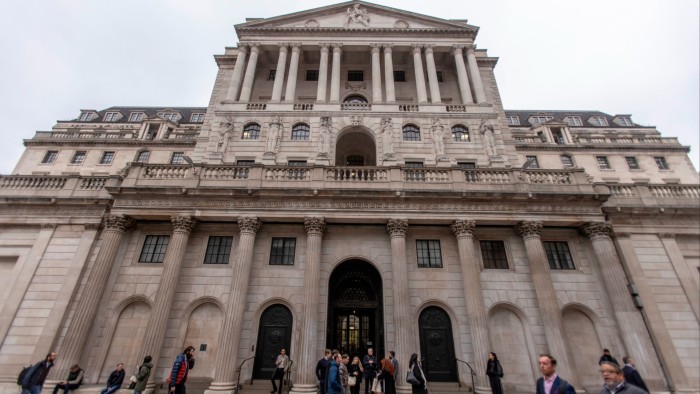Consumers face a darkening outlook across their borrowing and investments due to a UK debt market sell-off that has deepened since the new year.
Yields for UK government bonds, or gilts, along with US Treasuries and other sovereign bonds, have risen as investors expect interest rates will remain higher for longer due to stickier-than-expected inflation.
That has been compounded by investor anxiety over higher borrowing from October’s Budget and fears the UK may be entering a period of stagflation, where persistently higher prices constrain the Bank of England from cutting interest rates to boost the economy. The sell-off has taken the 10-year gilt yield up from 3.75 per cent in mid-September to as high as 4.93 per cent on Thursday.
FT Money explores what it all means for your finances.
Mortgages
The biggest impact of the sell-off will be on those looking to remortgage or buy a home in the coming months, since fixed-rate mortgages are driven by market expectations of where interest rates may be headed.
Swap rates, which track these expectations and are used by lenders to price their fixed-rate products, have risen sharply from just under 4 per cent in mid-September to more than 4.5 per cent this week.
So far, reaction to the sell-off has been limited. “We are starting to see it feed into the narrative . . . we’ve already seen fixed-rate mortgages nudge up slightly, but nothing too radical has changed in the last few days,” said David Hollingworth, director at mortgage broker L&C.
The average two-year fixed rate product fell by one basis point last week to 5.47 per cent, while the average five-year rate rose by a basis point to 5.25 per cent, according to Moneyfacts, a financial data company.
“We’re a complete world away from the mini-Budget,” said Hollingworth, referring to the Truss government’s fiscal statement in 2022, which drove a sharp rise in borrowing costs and immediately hit mortgage rates. “The mini-Budget came out of the blue and markets had to adjust very quickly. Lenders almost couldn’t price [mortgages] because of the volatility. We’re not seeing that at the moment.”
That said, if you are considering a house purchase or need to remortgage, the advice is not to hang around.
“Five-year fixed rates are still pretty cheap now, especially if you have a larger deposit,” said Aaron Strutt, director at mortgage broker Trinity Financial. “If rates are going to go up over the short term and your mortgage [for renewal] is coming up in four months’ time, it makes sense to take a new deal now and then potentially swap to another if rates come down.”
Pensions
Those in their 20s and 30s and a long way from retirement have little to fear from the bond turmoil — a blip in the long term when it comes to their pensions, said Sir Steve Webb, partner at pensions consultancy LCP and a former Liberal Democrat minister.
But older people whose pensions are being “lifestyled” may want to pay close attention, since their investments are moved out of equities and into bonds, said Olly Cheng, senior financial planning director at wealth manager Rathbone.
However, “unless you’re totally loaded up on long-dated bonds, it’s not time to panic”, said Laith Khalaf, head of investment analysis at AJ Bell.
The “best thing” that those with lots of long-dated bond exposure can do is “try to leave the pot alone and, if possible, hold off withdrawal,” said Webb. “What we’ve seen before is that people panic and sell what they’ve got, crystallising their losses. If you hold on, you don’t know how long or by how much, but bond prices could [go back up].”
Higher gilt yields usually result in lower annuity prices and with pensions subject to inheritance tax from 2027, the income guaranteed by annuities might look attractive for retirees.
Khalaf cautioned: “The problem with annuities is you lock into them for life. They’re good for producing a secure income stream, but that will totally disappear when you die. You can build in some protections but that will lower the rate you’re getting.”
Savings
Most experts say that the ripples in the bond market will have little direct impact on savings rates in the short term, which are driven by the base rate set by the Bank of England, currently at 4.75 per cent.
“The bond drama isn’t likely to get the savings market out of its seat at the moment — it’s not in the knee-jerk reaction business,” said Mark Hicks, head of active savings at investment platform Hargreaves Lansdown. “If yields don’t fall back in the coming days, as the market more fully digests news out of the US, we could see expectations for rate cuts pushed out further.”
Currency and the FTSE
Against the dollar, the pound has fallen in tandem with the gilt sell-off, driven by uncertainty over the UK’s fiscal outlook and the threat of inflationary tariffs under the incoming Trump administration in the US.
A weaker pound means higher prices for those holidaying abroad, but is better news for British multinational companies with dollar-denominated earnings. “For now, the weaker pound is providing a tailwind for the FTSE 100,” said Susannah Streeter, head of money and markets at Hargreaves Lansdown. “However, gains are being held back, with retailers like M&S losing ground over concerns about the UK economic outlook.”
Additional reporting by Ian Smith
Read the full article here

